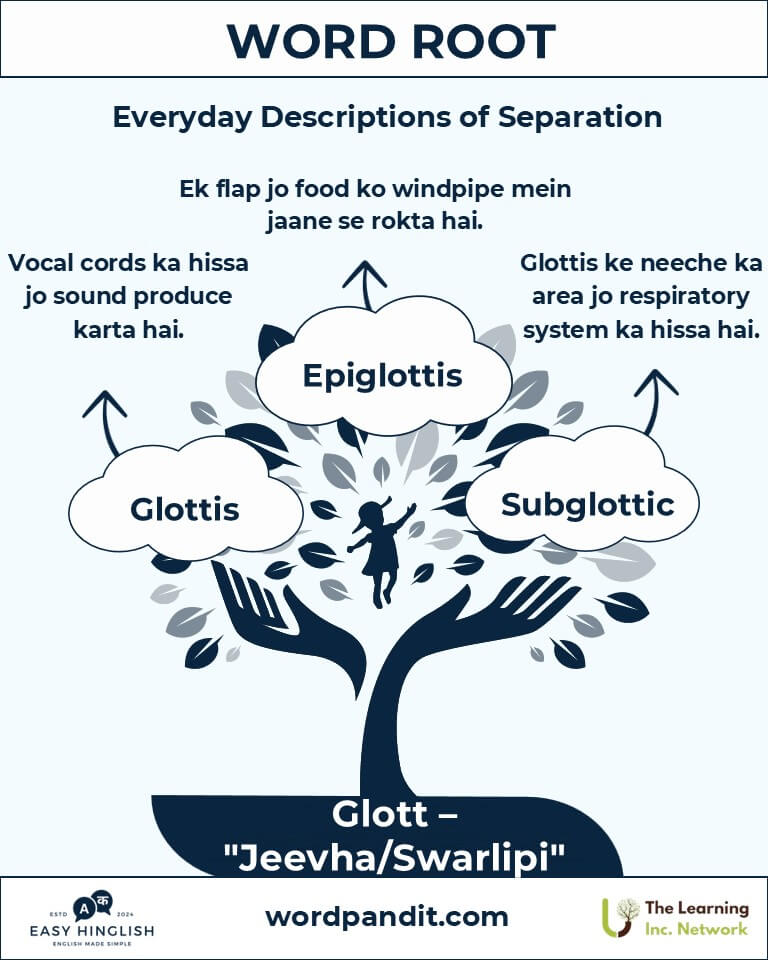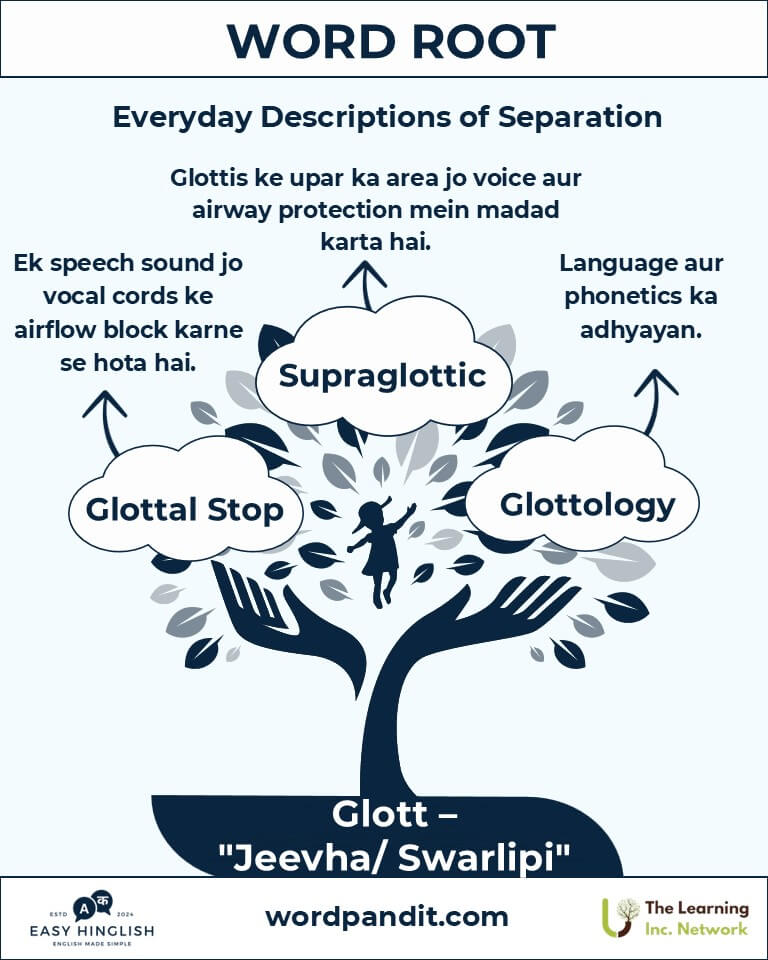Glott: The Role of the Tongue in Language and Anatomy
(Glott: भाषा और काया शास्त्र में जीव्हा की भूमिका)
Discover the fascinating root "glott," derived from Greek, meaning "tongue." Found in terms like "glottis" and "epiglottis," this root highlights the intricate role of the tongue in speech and anatomy, revealing its vital contributions to language, breathing, and more.

Table of Contents
- Introduction: The Essence of Glott
- Etymology and Historical Journey
- Mnemonic: Unlocking the Power of Glott
- Common Glott-Related Terms
- Glott Through Time
- Glott in Specialized Fields
- Illustrative Story: Glott in Action
- Cultural Significance of Glott
- The Glott Family Tree
- FAQs About the Glott Word Root
- Test Your Knowledge: Glott Mastery Quiz
- Conclusion: The Living Legacy of Glott
Introduction: The Essence of Glott
(ग्लॉट के मूल का परिचय - ग्लॉट की व्याख्या)
The root "glott" originates from the Greek word "glotta" or "glossa," meaning "tongue" or "speech." It plays a crucial role in both language and anatomy, particularly in the formation of sound and breathing.

Etymology and Historical Journey
(शब्द की उत्पत्ति और इतिहासी यात्रा)
The term "glott" has been used since ancient Greece, evolving into Latin and later into English. It became a part of anatomical terms related to the larynx, such as "glottis," which refers to the vocal cords and their opening.
Mnemonic: Unlocking the Power of Glott
(ग्लॉट की शक्ति को Mnemonic के ज़रिए याद रखें)
Imagine a singer using their vocal cords, shaping sounds through their glottis to create beautiful music.
(कल्पना करें कि एक गायक अपने स्वरयंत्र (glottis) का उपयोग कर ध्वनियों को आकार देता है और सुंदर संगीत बनाता है।)
Mnemonic Device:
"Glott guides the sounds we speak, from words to songs, it shapes our speech!"
Common Glott-Related Terms
(ग्लॉट से जुड़े सामान्य शब्द और उनके अर्थ)
- Glottis: The part of the larynx consisting of the vocal cords and the space between them.
Example: "The glottis controls airflow and sound production." - Epiglottis: A flap of tissue that prevents food from entering the windpipe.
Example: "The epiglottis protects the airway while swallowing." - Glottal Stop: A sound made by closing the glottis.
Example: "The word 'uh-oh' includes a glottal stop."
Glott Through Time
(ग्लॉट का इतिहास में परिणाम)
- Ancient Greece: Used to refer to the tongue and speech.
- Medieval Times: Adopted in medical literature for describing the vocal cords.
- Modern Science: "Glottal stops" and phonetics developed in linguistic studies.
Glott in Specialized Fields
(विशेष क्षेत्रों में ग्लॉट की भूमिका)
- Anatomy: The study of the glottis and epiglottis in respiration.
- Phonetics: The role of the glottis in speech sounds.
- Medicine: Disorders affecting the glottis can impact voice production.
Illustrative Story: Glott in Action
(ग्लॉट की प्रेरणादायक कहानी)
Raj, an aspiring singer, struggled with voice control. His vocal coach taught him about the glottis and how controlling it could improve his singing. Through practice, Raj mastered his vocal cords and became a renowned singer. His journey showed how understanding the "glott" can transform voice and communication.
Cultural Significance of Glott
(ग्लॉट की सांस्कृतिक महत्व)
The concept of "glott" extends beyond science into culture and tradition. Singing, storytelling, and even chanting in religious ceremonies all rely on the vocal cords. The ability to produce speech has been a defining trait of human civilization.

The Glott Family Tree
(ग्लॉट Family के शब्द)
- Glott- (Greek: "tongue")
- Glottis: The part of the throat that helps produce sound.
- Epiglottis: The flap that prevents choking while swallowing.
- Phon- (Greek: "sound")
- Phonetics: The study of speech sounds.
- Vocal- (Latin: "voice")
- Vocalization: Producing sound using the vocal cords.

FAQs About the Glott Word Root
(ग्लॉट के जुडे प्रश्न और उत्तर)
Q: "Glott" ka kya matlab hai?
A: "Glott" Greek word "glōtta" se derived hai, jiska matlab hai "tongue" (jeevha). Yeh anatomical aur linguistic concepts se juda hai.
Q: Glottis kya hai?
A: Glottis vocal cords ka part hota hai jo sound produce karta hai. Yeh respiratory aur speech systems ke liye important hai.
Q: Epiglottis ka role kya hai?
A: Epiglottis ek cartilage ka flap hai jo food aur liquid ko windpipe mein jane se rokta hai. Yeh airway ko safe rakhta hai.
Q: Glottal stop kya hai aur yeh kahan milta hai?
A: Glottal stop ek speech sound hai jo airflow ko vocal cords par block kar deta hai. Arabic, Hawaiian, aur English (e.g., "bottle") mein common hai.
Q: "Glott" sirf anatomy tak simit hai?
A: Nahi, "Glott" linguistics mein bhi widely use hota hai. Jaise, "glottalization" speech disorders ke treatment mein important role play karta hai.
Q: Subglottic aur supraglottic regions mein kya fark hai?
• Subglottic: Glottis ke neeche ka region.
• Supraglottic: Glottis ke upar ka region jo swallowing aur airway protection ke liye important hai.
Q: Speech therapy mein "glott" ka kya role hai?
A: Speech therapists glottal insufficiency aur vocal cord issues treat karte hain. "Glott" ka understanding in treatments mein madad karta hai.
Test Your Knowledge: Glott Mastery Quiz
1. Glott ka matlab kya hota hai?
2. Epiglottis ka main function kya hai?
3. Glottal stop kya hota hai?
4. Subglottic region kahan located hota hai?
5. Kaunsa term language sounds ke study ke liye use hota hai?
Conclusion: The Living Legacy of Glott
(Glott की जीवंत विरासत)
The root "Glott" remains crucial in understanding human speech and communication. From linguistics to anatomy, its role in voice production and language formation continues to impact our daily lives.








